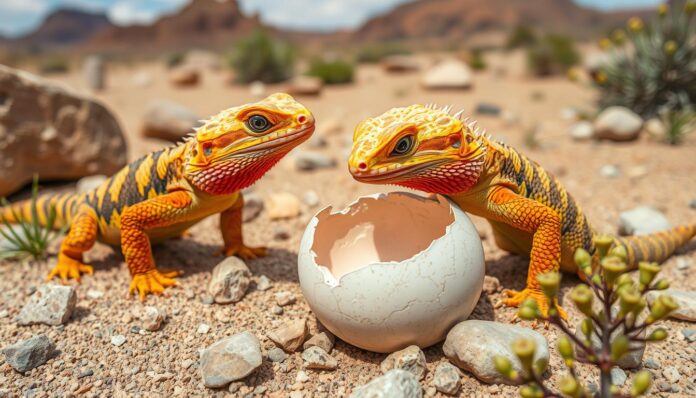Can Bearded Dragons Eat Eggs
Bearded dragons can safely eat up to half an egg every other week. This makes eggs a good protein source for them. It’s important to know what eggs are safe for bearded dragons to eat, as it affects their health.
Do bearded dragons eat bird eggs? What are the good and bad things about giving them eggs? It’s key to understand how eggs fit into their diet.
Knowing what bearded dragons need to eat is critical for their health. They can have eggs as an occasional treat. But, it’s important to know which eggs are safe and how often to give them.
Bearded dragons need a balanced diet, and eggs play a part in it. It’s important to know the risks and benefits of eggs in their diet.
Understanding Bearded Dragons’ Natural Diet
Bearded dragons are omnivores, needing a mix of fruits, veggies, and insects. This mix is key to getting enough protein and calcium. When thinking about can bearded dragons eat chicken eggs, knowing their natural diet is important. In the wild, they munch on leaves, flowers, and insects.
In captivity, their diet should be half plants and half insects. Feeding eggs to bearded dragons can be good, but we must know their nutritional needs. Young dragons need more calcium than phosphorus.
Wild Bearded Dragon Eating Habits
In the wild, bearded dragons eat leaves, flowers, and insects. They also hunt small animals like lizards and snakes. Knowing what they eat in the wild helps us feed them right in captivity.
Nutritional Requirements in Captivity
In captivity, bearded dragons need a diet full of protein, calcium, and other nutrients. Their needs change with age, size, and health. How often do bearded dragons eat eggs depends on their individual needs.
Role of Protein in Their Diet
Protein is very important in a bearded dragon’s diet, more so when they’re growing. They need a mix of animal and plant proteins. Feeding eggs to bearded dragons can be a good protein source, but it must be part of a balanced diet.
Can Bearded Dragons Eat Eggs? The Complete Answer
Bearded dragons can eat eggs, but it’s important to know which eggs are safe and nutritious. Eggs are packed with protein, calcium, vitamins, and minerals. But, they should be given in moderation to keep your bearded dragon healthy.
Eggs are a great source of protein, with a large chicken egg having about 6 grams. This is very beneficial for young bearded dragons that need lots of protein. It’s important to remember that too much protein can harm your pet, so don’t overdo it.
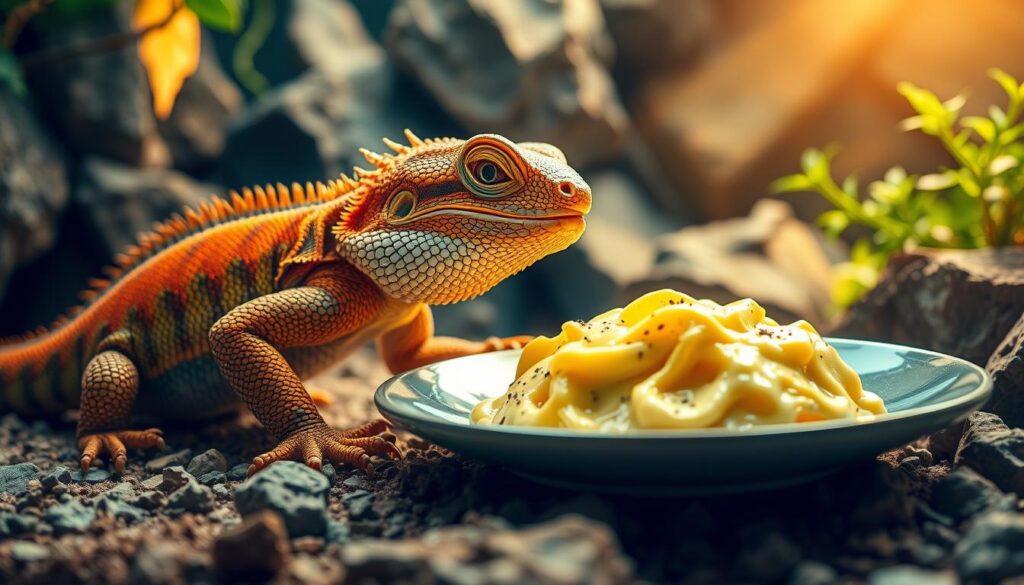
When feeding eggs to bearded dragons, there are some rules to follow. They can eat eggs, but only once every other week. The right amount is half an egg per time.
Here are some key points to consider when feeding eggs to bearded dragons:
- Bearded dragons can safely eat quail eggs, which can be given whole because they’re small.
- It’s best to avoid raw eggs because of the risk of bacteria. Cooked eggs are safer.
- Eggs are also a good source of vitamins A and B12.
A large Grade A egg has about 6.24 grams of protein, 5.0 grams of fat, and 24 milligrams of calcium. The right balance of calcium and phosphorus is important for bearded dragons. Knowing which eggs are safe and nutritious helps owners make better choices for their pets.
Nutritional Benefits of Eggs for Bearded Dragons
Bearded dragons eat eggs for important nutrients. Owners often wonder what eggs are safe for their pets. Eggs are packed with protein, vitamin D, and other key vitamins and minerals like vitamin A, B12, and iron. But, it’s important to know if bird eggs are safe and if they offer the right nutrients.
Protein Content and Quality
Eggs are a top-notch protein source, with about 6.24 grams in a large egg. They’re perfect for adding to a bearded dragon’s diet, which needs a mix of protein, veggies, and fruits.
Essential Vitamins and Minerals
Eggs also have vitamins and minerals like vitamin D, calcium, and phosphorus. The calcium to phosphorus ratio in eggs is about 1:4, which is not the best for bearded dragons. But, eggs can be a good part of their diet if given in small amounts.
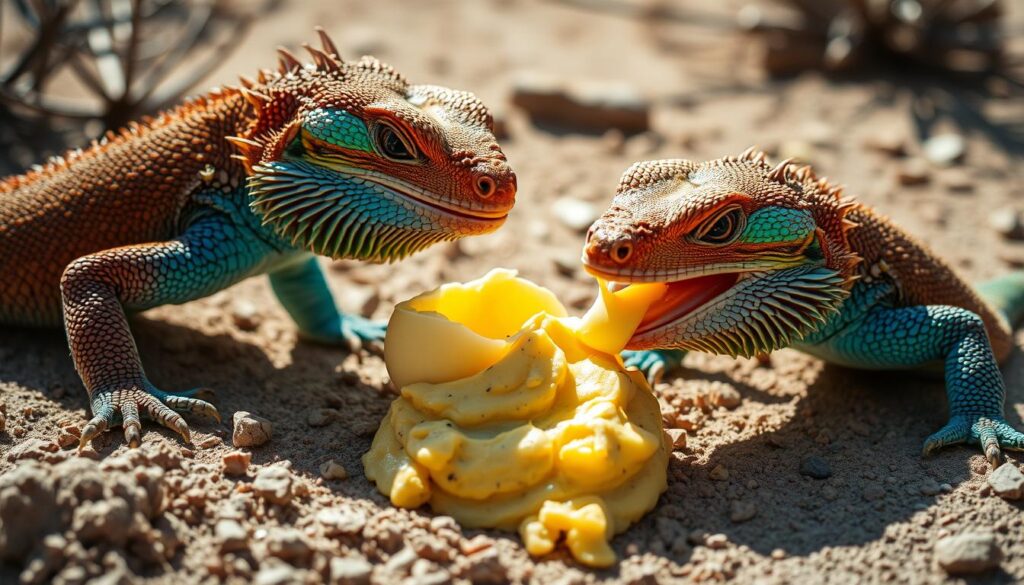
Calcium to Phosphorus Ratio
Keeping the right balance of calcium and phosphorus is key for bearded dragons’ health. Eggs have a lower ratio than ideal, but they can be part of a balanced diet. For example, a bearded dragon can have eggs once or twice a week. This should be paired with dark leafy greens and other foods rich in calcium.
| Nutrient | Amount per large egg |
|---|---|
| Protein | 6.24 grams |
| Vitamin D | 40 IU |
| Calcium | 24 milligrams |
| Phosphorus | 92.6 milligrams |
Types of Eggs Safe for Bearded Dragons
Feeding eggs to bearded dragons is a good choice, but you need to know which ones are safe. Can bearded dragons eat chicken eggs? Yes, but with some care. They can have boiled eggs, but not raw ones because of Salmonella risk.
Eggs can be a nutritious part of their diet. But, it’s important to remember that a balanced diet is key. This includes veggies and fruits, not just eggs.
Here are some tips for feeding eggs to bearded dragons:
- Boiled eggs are a good source of protein and can be fed to bearded dragons in moderation.
- Avoid feeding raw eggs due to the risk of Salmonella.
- Consider the size of the egg and the age of the bearded dragon when determining the frequency of feeding.
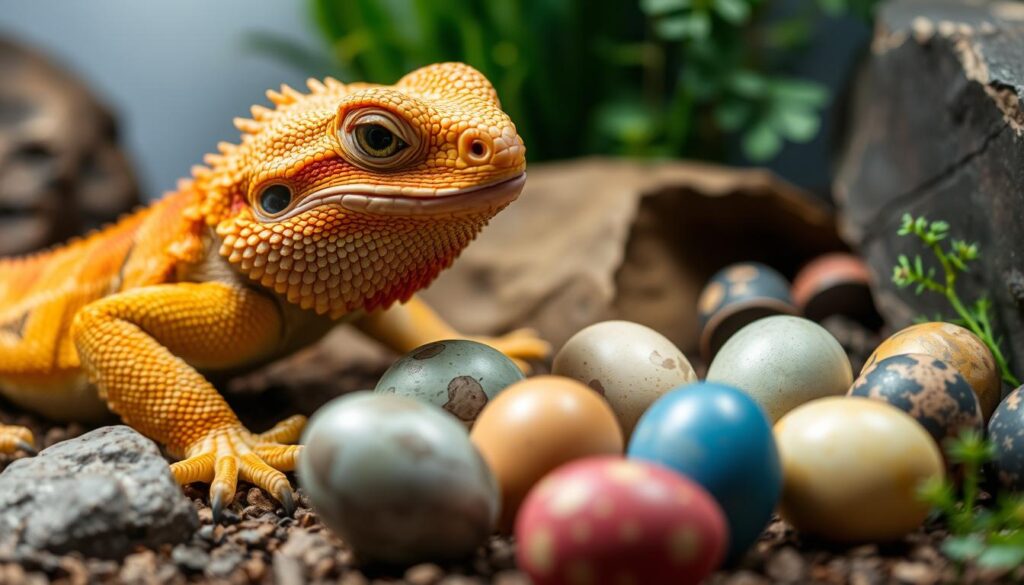
In conclusion, feeding eggs to bearded dragons can be a healthy choice. Just make sure to do it in moderation and with care. By following these tips, you can give your bearded dragon a balanced diet.
| Egg Type | Safety for Bearded Dragons |
|---|---|
| Boiled Eggs | Safe |
| Raw Eggs | Not Safe |
Proper Preparation Methods for Feeding Eggs
Feeding eggs to bearded dragons needs careful preparation for their health. They can eat chicken and quail eggs, which are protein-rich. But, it’s key to cook the eggs right to avoid health risks.
Boiling or scrambling eggs are good ways to cook them. Boiling is simple, while scrambling adds texture. Always serve eggs in small amounts to avoid overfeeding.
Cooking Requirements
Cooking eggs for bearded dragons requires careful attention. Eggs should be cooked until yolks are set and whites firm. This prevents bacterial contamination.
Portion Sizes
It’s important to control portion sizes when feeding eggs. Aim for about 1/8 cup of cooked eggs per meal. This helps avoid overfeeding and ensures they get the right nutrients.
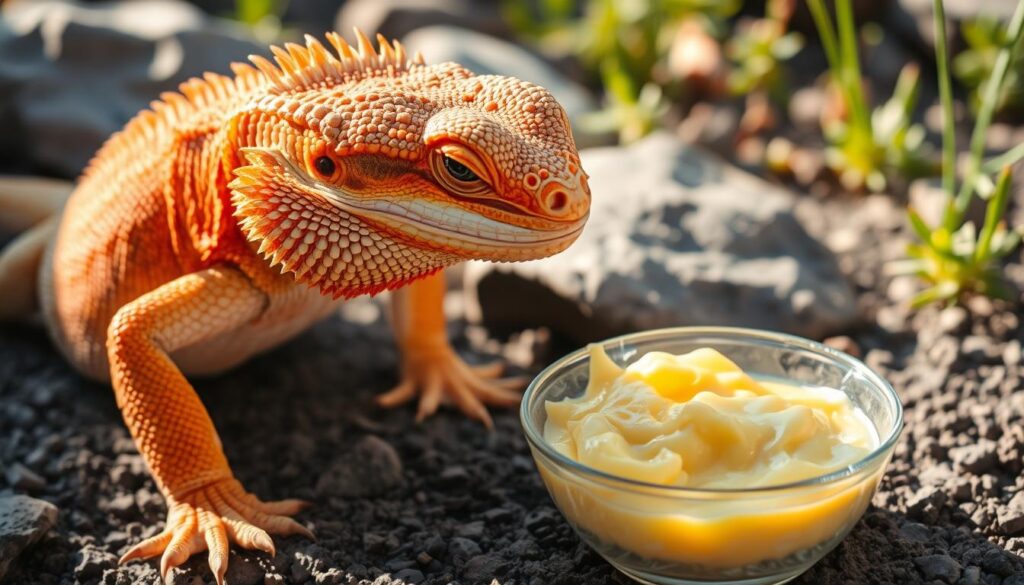
Safe Serving Techniques
Safe serving techniques are vital to prevent health risks. Serve eggs in a shallow dish and cut them into small pieces. Remove any uneaten eggs after a few hours to prevent spoilage.
Bearded dragons can eat different types of eggs, like:
- Chicken eggs
- Quail eggs
- Duck eggs
Eggs are a good protein source for bearded dragons. They can be a nutritious part of their diet when prepared and served correctly.
| Egg Type | Protein Content | Recommended Serving Size |
|---|---|---|
| Chicken Eggs | 6-7 grams per large egg | 1/8 cup cooked, chopped |
| Quail Eggs | 1-2 grams per small egg | 1/4 cup cooked, chopped |
| Duck Eggs | 9-10 grams per large egg | 1/8 cup cooked, chopped |
Potential Risks and Considerations
Feeding eggs to bearded dragons can pose health risks. Eggs are high in protein and fat, which can lead to obesity if given too much. It’s important to remember that eggs should not be a main part of their diet.
Bearded dragons can eat bird eggs, but their health should always come first. Cooking eggs is key to avoid Salmonella infection. Also, eating too many eggs can lead to vitamin A toxicity.
It’s best to treat eggs as an occasional snack. Many owners choose to give hard-boiled eggs to avoid raw egg risks.
Signs of Egg Allergies
Bearded dragons may show signs of egg allergies like digestive problems or lethargy. If you see these signs, talk to a vet right away. Some dragons might be more likely to have allergies, so watch their health closely.
Digestive Issues to Watch For
Bearded dragons can get digestive issues from eating eggs that aren’t cooked right or if they eat eggs too often. Make sure eggs are cooked well and given in small amounts. A balanced diet with many different foods is best for their health.
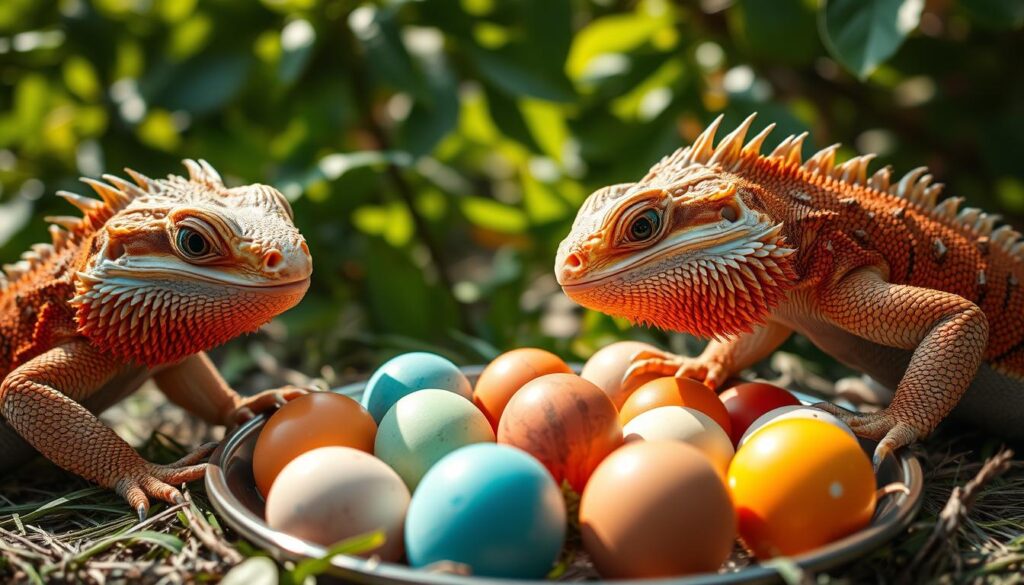
Knowing the risks of feeding eggs to bearded dragons is key to their health. By understanding how to safely feed them eggs, owners can give their pets a good diet.
| Egg Nutrition Facts | Value |
|---|---|
| Protein content in one large hard-boiled egg | 6 grams |
| Fat content in one large hard-boiled egg | 5 grams |
| Calcium content in one large hard-boiled egg | 25 mg (3% Daily Value) |
| Phosphorus content in one large hard-boiled egg | 88 mg (8% Daily Value) |
How Often Should Bearded Dragons Eat Eggs?
Feeding eggs to bearded dragons can be a nutritious addition to their diet. It’s important to know how often they should eat eggs. When thinking about can bearded dragons eat chicken eggs, remember to give eggs in moderation. The frequency of feeding eggs depends on their age and the season.
Bearded dragons should eat eggs in moderation, like half an egg every two weeks. This helps prevent health problems from too much protein. How often do bearded dragons eat eggs is a common question. The answer is finding a balance between nutrients and avoiding overfeeding.
Age-Based Feeding Guidelines
Young bearded dragons need more frequent feedings than adults. Hatchlings should eat small meals two to three times daily. Adults can eat live prey three to four times a week. When feeding eggs, consider their age and adjust the frequency.
Seasonal Considerations
Bearded dragons’ dietary needs change with the season. They may need more food when active and less when brumating. Adjusting the egg-feeding frequency based on the season helps provide a balanced diet.
Incorporating Eggs into a Balanced Diet
Bearded dragons are omnivores and can eat different types of eggs. This includes chicken, quail, duck, and exotic eggs. Eggs are a good protein source for them, with a large egg having about 6.24 grams of protein. But, eggs should be given in small amounts to prevent health problems.
A balanced diet for bearded dragons includes veggies, fruits, and proteins. Eggs can be a nutritious part of this diet. It’s important to cook eggs well to avoid salmonella. The best cooking methods are hard-boiled, scrambled, poached, or omelet.
Here are some guidelines for feeding eggs to bearded dragons:
- Babies and juveniles (under 1 year): 1 egg per week
- Healthy adults (maintenance): 0.5 eggs per week
Egg shells are too sharp for bearded dragons and can cause impaction. So, it’s best to serve eggs without the shells.
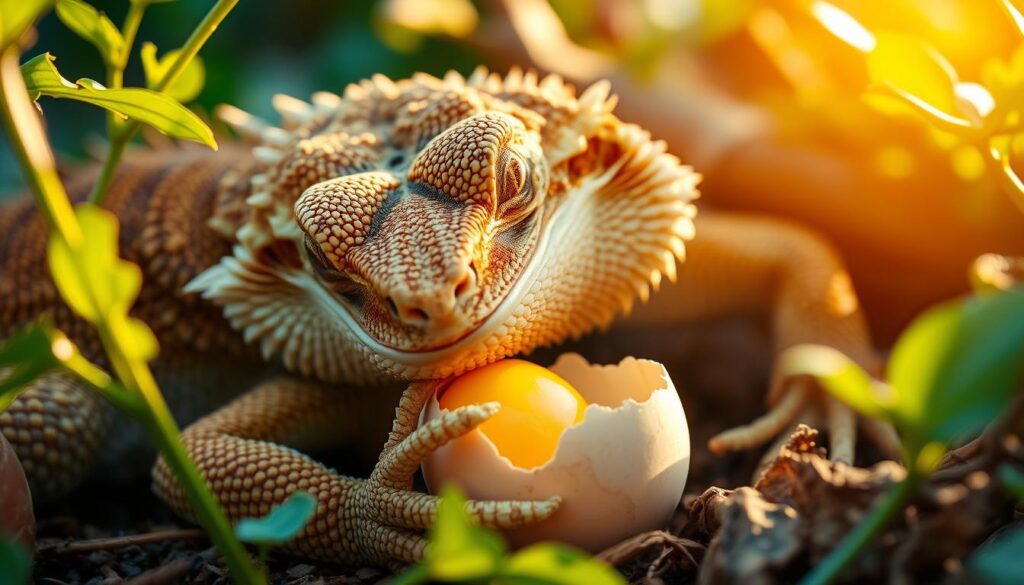
In conclusion, eggs are a great addition to a bearded dragon’s diet. They provide important protein and nutrients. By following the guidelines and cooking eggs well, owners can ensure their pets stay healthy and balanced.
Conclusion: Best Practices for Feeding Eggs to Bearded Dragons
Adding eggs to a bearded dragon’s diet can be very good for them. But, it’s important to do it right to keep them healthy. Bearded dragons need a mix of insects, veggies, and eggs in their diet.
Eggs are full of protein, which helps bearded dragons grow strong. But, they should only eat eggs once or twice a week. This keeps their diet interesting and healthy. Make sure to cook eggs without butter or oil.
It’s also key to watch the calcium and phosphorus levels in their diet. Bearded dragons need these minerals for strong bones. Make sure they get enough calcium from other foods to avoid health problems.
By following these tips, bearded dragon owners can help their pets live well. They’ll get the good stuff from eggs without any health risks. With the right care, bearded dragons can live long, happy lives.
FAQ
Can bearded dragons eat eggs?
Yes, bearded dragons can eat eggs as part of a balanced diet. Eggs are a good source of protein and essential nutrients for them.
What types of eggs can bearded dragons eat?
Bearded dragons can safely eat boiled or scrambled chicken eggs and quail eggs. But, they should avoid raw eggs to prevent salmonella and other infections.
How often should bearded dragons eat eggs?
The frequency of feeding eggs to bearded dragons depends on their age and needs. Generally, eggs should be given 2-3 times a week. They should be given in moderation as part of a balanced diet.
What are the nutritional benefits of eggs for bearded dragons?
Eggs are a great source of high-quality protein and essential vitamins and minerals. They have vitamin A, vitamin D, and calcium. The calcium-to-phosphorus ratio in eggs is also good for their bones.
What are the possible risks of feeding eggs to bearded dragons?
Eggs can be good for bearded dragons but should be introduced slowly and in small amounts. Risks include digestive issues, egg allergies, and an unbalanced diet if eggs are too big a part of their diet.
How should eggs be prepared for bearded dragons?
Eggs should be cooked well, either boiled or scrambled, to remove bacteria risks. The size of the egg portions should match the bearded dragon’s size and age. Eggs should be served at room temperature or slightly warm.
Can bearded dragons eat bird eggs?
Bearded dragons can technically eat bird eggs, but it’s not recommended. Bird eggs might have different nutrients and could be riskier for bacterial contamination than chicken or quail eggs.


